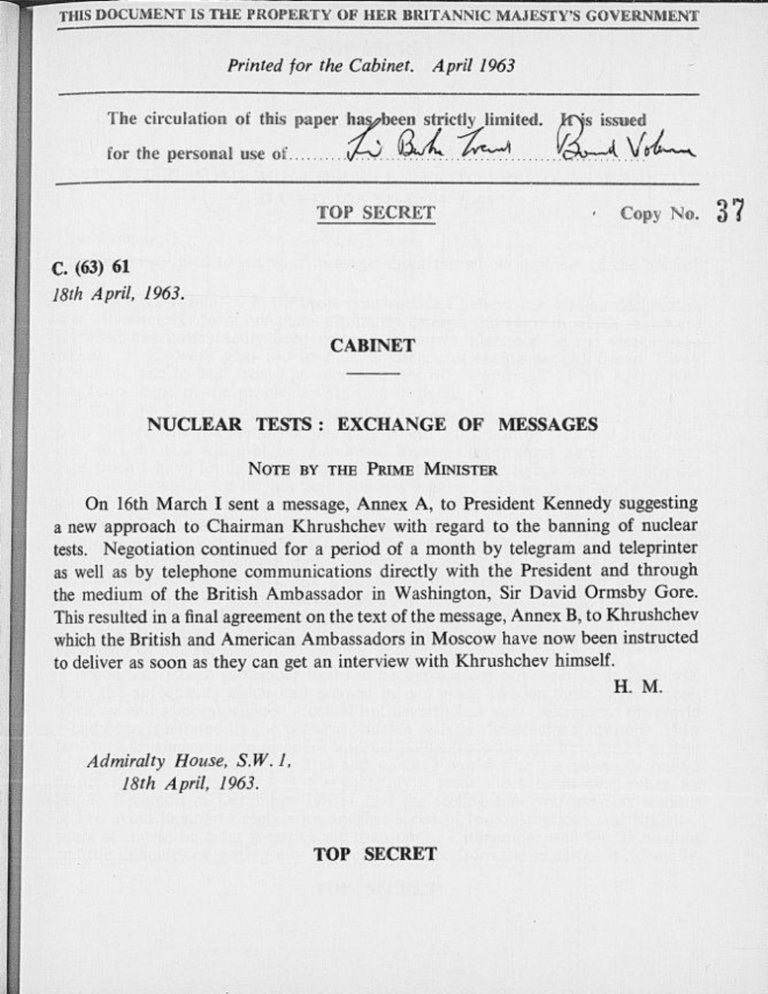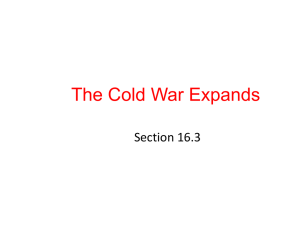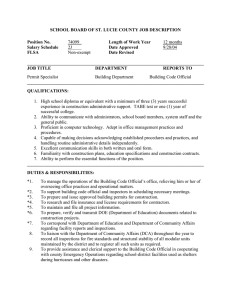Document 11231857
advertisement

THIS DOCUMENT IS T H E P R O P E R T Y O F H E R BRITANNIC M A J E S T V S G O V E R N M E N T Printed for the Cabinet. April 1963 The circulation of this paper has-been nas^oeen strictl siricii yy limited. nmiiea. JETfs * t \ s issue issuedd for the personal use of... TOP SECRET - Copy N o . C. (63) 6 1 18th April, 1963. CABINET NUCLEAR TESTS : EXCHANGE OF MESSAGES NOTE BY THE PRIME MINISTER On 16th March I sent a message, Annex A, to President Kennedy suggesting a new approach to Chairman Khrushchev with regard to the banning of nuclear tests. Negotiation continued for a period of a month by telegram and teleprinter as well as by telephone communications directly with the President and through the medium of the British Ambassador in Washington, Sir David Ormsby Gore. This resulted in a final agreement on the text of the message, Annex B, to Khrushchev which the British and American Ambassadors in Moscow have now been instructed to deliver as soon as they can get an interview with Khrushchev himself. H. M. Admiralty House, S.W. 1, 18th April, 1963. ANNEX A TEXT OF THE P R I M E M I N I S T E R S LETTER TO P R E S I D E N T K E N N E D Y D A T E D 16th MARCH, 1963 Dear Friend, I was very glad to get your message about the whole problem of the nuclear forces. The more I think of it, the more constructive I believe our Nassau declaration was. In whatever form our plans ultimately emerge, the spirit in which they were launched has undoubtedly been more and more understood as the weeks have passed. I was very glad too to have a chance of seeing an old friend, Livvy Merchant, and to hear from him some account of his journeys. I left Alec Home to discuss some of the problems with him in detail. With the signature of the technical agreement between our countries arising from Nassau, the foundation of one part of our work will be well and truly laid. Nor do I think it will ever be abandoned by any Government here. After long experience I have found that we are all of us apt to say things when we are not in authority which we do not feel either willing or able to carry out when we succeed to responsibility. But thinking so much about all these matters has led me, and I expect you, to turn back to another part of this nuclear problem, far more constructive in reality; for it might open the path to something better for the world than merely building vast forces which if not used are wildly expensive, if used are wholly destructive to mankind, and which at the best keep a kind of uneasy peace by a balance of horror. So, after much thought, I am impelled to write to you to give you my ideas about the question of nuclear tests and the possibility of an agreement to ban them. You and I both remember well the background of our meeting at Bermuda. Then the agreement, which had seemed in our grasp two or three years before, when we had a moratorium—informal but nevertheless very welcome to the world - h a d been frustrated by the massive Russian tests in the previous autumn. How far Mr. Khrushchev made these for internal political reasons, or how far he wished to frighten and impress the neutral and unallied world with his power, is only a matter for speculation. But it was certainly a great shock to us all. When we met in Bermuda in December 1961 I had the feeling that you were as anxious as I to avoid having to reply with another series of tests, American and British— yours of course on a far greater scale than ours. I remember well the discussions and the difficulty of getting any very clear picture from the experts. Incidentally, the more I discuss this problem, the more I find that we laymen talk about the technical aspect and the experts always tell us that it is a political problem. Perhaps there is some lesson to be drawn from this. At Bermuda, we resisted the temptation to hold a new series on political grounds as an answer to the Russians, although we were, with some difficulty, persuaded that it was necessary to do so on military grounds in order to protect the vital interests of the Western Alliance. This was the theme of our announcement at Bermuda. It was on this basis that I was able to persuade my colleagues and Parliament to give their consent to the joint operation and to the use of Christmas Island. All the same in the Christmas atmosphere of that year I felt impelled to write to you an inexcusably long letter to set out my thoughts and feelings. After some exchange of messages, we decided to accompany our announcement of tests by a rather novel approach to the question, which made a considerable impression, in both our countries. We sent joint letters to Mr. Khrushchev on February 7, 1962, followed by two sets of letters in broadly similar terms a week and 10 days later. The point, you will remember, was that although the Western tests had to be made, we hoped that this series would be regarded as the end of a definite round and that we should all try to concentrate on the Disarmament Conference about to open in Geneva—to this body the subject of the Test Ban had been transferred at the request of Russia. We both promised to take a personal interest in this and to try to bring matters to a head whenever the moment seemed right. The words that I used to Mr. Khrushchev on February 25 were: " As I told you in my letter of February 14, I am also very ready to take part personally in these negotiations, when it seems that the presence of Heads of Government can be of positive value. Two situations might arise in which this method might be fruitful. The first is if the Conference is making satisfactory and definite progress. In such a case a meeting of the Heads of Government might well serve to consolidate what had been achieved and to take a further step towards an actual agreement. The second situation is one in which certain major and clear points of disagreement have emerged which threaten to hold u p further progress. In that case the Heads of Government should perhaps meet in order to try to break the deadlock." On February 24 you sent a message to Khrushchev in which you said: " The Heads of Government should meet to resolve explicit points of disagreement which might remain after the issues have been carefully explored and the largest possible measures of agreement have been worked out at the diplomatic level." T h e fact that both Dean Rusk and Alec Home went to Geneva for the opening Conference to start it off was intended to underline the importance which you and I attached to the meeting. During recent months the negotiations have made considerable progress. The Russians have now publicly accepted the principle of inspection. It is true that they seemed to accept this three years ago, but they had afterwards very definitely rejected it. They have now accepted it definitely and have also accepted three annual inspections. The West has moved down from 20 inspections to seven. So, from the man in the streefs point of view, the two sides have come a great deal nearer. Indeed, to the layman, we would seem so near that it would be almost inconceivable that the gulf could not be bridged. There are, of course, a number of other points to be settled in connexion with these inspections so as to ensure that they are a reality and not a farce. But I do not feel that the Russian refusal to discuss them until the number is settled means that they will use these points as a way of bringing the negotiations to an end. If they were to do so after an agreement on numbers had been reached they would be in a very bad posture before the world. I have wondered in my own mind and tried to find some answer to the question as to why Mr. Khrushchev suddenly moved forward on the inspection issue. So long as he stood upon the principle that any form of inspection involved espionage he had at least a logical position. We may think it ridiculous but it is in conformity with the well-known Russian sensitiveness to contacts with the outside world and with the almost Oriental xenophobia which has been traditional in Russia whether Tsarist or Communist. But, having abandoned this position, it is difficult to argue that three inspections do not endanger security while four, five, six or seven might. I wonder perhaps whether there was some real misunderstanding in his mind over this, and whether he somehow got it into his head that if he moved on the principle, you would accept a quota of two or three. Mr. Khrushchev, like an old elephant, has a very tenacious memory. For example, in conversation in Moscow in 1959 when this matter was first under discussion I casually mentioned various figures for annual inspections, from 12 down to three, as an illustration of my general argument in favour of a test agreement. Since then he has affected to regard this chance observation as a substantive proposal by the British Government. Of course he should know that it was not. But that is the way he has learned to think—or double think. Similarly, something must have happened recently to explain Khrushchev's apparently genuine mood of exasperation and distrust. However, whatever may be the explanation, that is the position, and there now appears to be a deadlock based upon the question of number. What, then, are we to do? Of course, there are very strong arguments for doing nothing. Strong logical arguments, strong political arguments. But this is not the spirit in which you, who carry the largest responsibility, before God and man, have faced your duty, nor that in which I have tried to do the same. I have a feeling that the test ban is the most important step that we can take towards unravelling this frightful tangle of fear and suspicion in East-West relations— important in itself and all the more important for what may flow from it. All the same, strictly it is the Russian turn to move. They have come from nothing to three; you have come from 20 to seven, and it is up to them to make a bid. If they want a Treaty they can get o n e - a n d , it will be argued if they do not want one, why negotiate at considerable risk. Why is it that the West always have to move? Why is it that all the concessions seem to come from us? And so on. Then of course there are quite strong groups of opinion who are really in favour of tests. Some scientists think it is a pity not to know all you can know. It seems almost restrictive and reactionary not to blow things up to find out what would happen when they go off. Others are very fearful as to whether in some way or another important lessons might be learned by the Russians from a clandestine series of disconnected tests. I assume that this is the old question of yield for weight, which may have some bearing upon the development of the anti-missile missile in its most sophisticated form. On the other hand, there are equally strong bodies of opinion that feel that from a purely scientific point of view on the figures we are discussing there is not very much more danger in the small number of inspections than in the larger one. I have just been reading a short account of this whole story from the beginning and I am impressed by the fact that whenever we seem to get near a solution somebody finds out a new scientific theory. The big hole was itself a good example of this, and in that hole are likely—unless we are careful—to be buried the hopes of mankind. All the same, the arguments against moving can be powerfully put forward, and I have no doubt are very strong politically with you. To these that I have mentioned can be added that if we do sign a Test Ban the French and Chinese will stand out and so in the end we may not be so very much further on. Finally, it is alleged that there is not very much pressure on either side to start a new series of tests. However, since it seems to take a couple of years or more to evaluate one set of tests and to make the necessary preparation for the next, this lull may prove very deceptive. We may within a year or two be faced with the same situation which confronted us in 1961 in Bermuda. Apart from avoiding the practical difficulty that hangs over us in the near future, I am sure you will agree that we would gain enormously if this Treaty could be made. First, it would stop the contamination of the atmosphere. We have been thinking so much about the underground tests that we tend to forget the injury done by atmospheric testing. While it might not stop the Chinese and the French tests altogether, it would certainly drive them both underground, which is a good thing from this angle. Secondly, I am quite sure that it would have a very considerable effect upon some countries which may be hesitating about what to do. For instance, Sweden, India and Israel, and other countries which will be almost bound to enter the nuclear race unless they can find an excuse not to do so. Thirdly, the effect on the world of an agreement solemnly entered into by our two countries with Russia would be enormous. It would give a tremendous new sense of hope. We could probably succeed in giving a new impetus to the Disarmament Conference and might also give a lead on other fronts. It would be a great gain, of course, if Sweden, India, Israel and the rest would undertake not to test; but I have a feeling that if we get the test ban agreement, there would be another prize just as important to be secured. We ought to be able simultaneously to get a non-dissemination agreement; an undertaking, that is, from non-nuclear countries not to accept nuclear power at the gift of others, for their sole use, and from nuclear Powers not to give nuclear weapons or knowledge to non-nuclear countries. To me this seems the real key to the German problem; one which gives a good deal of anxiety both to the Russians and to us, and, to be fair, to many Germans; who are genuinely anxious lest in due course they or their successors will be forced to become a nuclear Power. It is quite true that Germany is bound by all kinds of agreements and undertakings. But these could easily be represented by a bad German in the future as the modern counterpart of Versailles. We know—only too well—what might follow from all that way of thinking. Indeed, speaking frankly, the most attractive part of Clause 8 of the Nassau Agreement is that it may give the Germans a sense of participation without incurring these dangers. But I feel that a test agreement accompanied by a non-dissemination agreement would serve to underline Clause 8 if we are able to bring Clause 8 into operation, and anyway would be effective in itself. No German could then say that Germany had been forced into this abnegation in a period of weakness just after the war when the present treaties or agreements were made. On the contrary the Germans could claim with pride that, with other great States, Germany had entered into this undertaking as a contribution to the solution of one of the gravest problems which confronts the world. At the same time, this is a prospect which must appeal equally to the Russians. The countries of the West have, thank God for it, decided to rebuild their bridges with Germany. We have tried to forget about the two wars and the Hitler persecutions and all the rest. This is true of your country and mine, and to be fair, of the French. All this is good. But then, without being cynical, we all have an interest, because the Germans are our Allies against the Communists. The Russians both hate and fear the Germans. They hate them, inspired by the cruel memories which we have decided to blot out; they fear them as an efficient hard-working, brave and determined people. Nor can they fail to be conscious of the pressure which they put continually upon German patience by the obstinacy with which they enforce to the division of Germany. For all these reasons, then, I think the tests ban, followed by adherence of other countries not to test, accompanied by a non-dissemination agreement which was reasonably well supported, would have a profound effect in removing the present state of tension in the world. Of course whatever agreement is made, the Russians might be able to evade it and we might not be able to catch them. From our point of view, if there are some 25 unidentified events of Magnitude 4 or over annually in Russia then of course with seven inspections we have nearly a one in four chance of catching them out; with five we have a one in five chance, and with only three we have one in nine. Naturally, if they make a definite series, we have a better chance of finding them out. There is also the possibility that they might so arrange the tests at the end of the year that we would have exhausted our right of inspection. However, this and other difficulties might be got over in negotiation, not merely by splitting the difference between seven and three but by some arrangement to carry over unused inspections to an agreed extent, from one year to another. Since our machines, whether operated overtly or covertly, will continue to improve we are likely to need fewer annual inspections as time goes on, and an arrangement of this kind for carry-over of inspections might be one way of allowing ourselves enough inspections at first without over-ensuring for the future. So much for the chances of our catching them if they cheated. However I am bound to say that I think they would be at great risk if they did cheat after signing the Treaty. Although they might have no moral inhibitions in breaking their world, I think they would be abashed at being publicly shown up before the world; and, what is more important, they would lose the great benefits of a non-dissemination agreement, with all that this implies in Central Europe. So we come to the problem of how we are to renew the negotiations with a view to bringing them to a satisfactory conclusion. Looking back to our declaration in 1962 I am bound to say that I feel myself under an obligation to act in acordance with what I then said. Certainly in my statement, which perhaps went further than yours, I undertook to do something about it in either of two situations, one of which is now approaching. There are various possibilities: (a) I can see the disadvantage in merely offering five inspections through the Geneva negotiators with no certainty that this would be accepted. A rejection would be very bad politically for you, although not so much for me. (b) I can see the dangers involved, although I think the advantages might well outweigh them, in simply suggesting that we all three should meet and try to settle the matter. If the West then offered five and Khrushchev stood out, our position might not be very dignified but it would not be ignoble. (c) We could summon a conference on the understanding that the conditions of the inspections were first brought near to a conclusion, so that we should only have to settle the final steps to be taken on these together with the question of numbers. But it would still be a risk. (d) Or, if it was better for you, I could write to you and Khrushchev either privately or publicly or both, suggesting that we should all meet at Geneva. If he refused, it would be a great disappointment and we should not get the agreement, but again it would not be discreditable. (e) Before suggesting either jointly or separately a conference of the Heads of Governments, we might make some further soundings. In this connexion, I still feel there is something queer about Khrushchev's move towards accepting the principle of inspection. There may have been some genuine misunderstanding in his mind, or perhaps some misunderstanding or misrepresentation by those Russians who reported to him what they picked up in Geneva. Possibly therefore you could send some personal message to Khrushchev on this matter or perhaps some emissary such as Averell or even your brother Bobby who would both clear up any misunderstanding and find out whether there was a chance of settling round about five or by some juggling with the numbers, including the conception of bisques and the limit for any one year, coupled of course with what I think could be made very attractive to Khrushchev, the non-dissemination aspect. Some of my telegrams report that he is supposed to have lost interest in the nuclear test ban but if that is so, it may weli be because he has not had the non-dissemination aspect sufficiently impressed upon him. I am sorry to inflict so long a letter on you, but I feel this very deep personal obligation upon me and it is one which, in some form or another, I must discharge before it is too late. I do not, as you know, want to trouble you on the telephone but I would be very glad to hear first from you either through David Gore or by teleprinter message, and then perhaps we could have a talk to clarify any outstanding points. I am sending this letter to you through David who is fully conversant with all our ideas and whom I know you trust as much as I do. HAROLD MAOMILLAN. ANNEX B T E X T O F THE P R I M E M I N I S T E R S L E T T E R T O MR. KHRUSHCHEV D A T E D 15th APRIL, 1963 Dear Mr. Chairman, You will recall that in February and March 1962, we had some correspondence about the Geneva Disarmament Conference, and in particular about the possibility of reaching agreement on the text of a treaty to ban nuclear tests. Both President Kennedy and I pledged ourselves to take a personal interest in the progress of this Conference on which so many of the hopes of mankind have been fixed. Last October we both indicated in messages to you our intention to devote renewed efforts to the problem of disarmament with particular reference to the proliferation of nuclear weapons and the banning of nuclear tests. Since then the Geneva meeting has continued but it has not reached the point of definite agreement. Nevertheless, some encouraging advance has been made. For example, your acceptance of the principle of on-the-spot verification of unidentified events has been of great value. Equally, the Western countries have been able to reduce the number of annual inspections for which they felt it essential to ask, from about 20 down to seven. The difference remaining is of course real and substantial, if only because it presents in practical form the effects of two different lines of reasoning. At the same time the actual difference between the three inspections which you have proposed and the seven for which we are asking, important though this is, should not be impossible to resolve. As regards the automatic seismic stations, the difference between us appears to be fairly narrow. We all have a duty to consider what are the needs of security; but we also have a duty to humanity. President Kennedy and I therefore believe that we ought to make a further serious attempt by the best available means to see if we cannot bring this matter to a conclusion with your help. We know that it is argued that a nuclear tests agreement, although valuable and welcome especially in respect of atmospheric tests, will not by itself make a decisive contribution to the peace and security of the world. There are, of course, other questions between us which are also of great importance; but the question of nuclear tests does seem to be one on which agreement might now be reached. The mere fact of an agreement on one question will inevitably help to create confidence and so facilitate other settlements. In addition, it is surely possible that we might be able to proceed rapidly to specific and fruitful discussions about the non-dissemination of nuclear power leading to an agreement on this subject. Such an agreement if it was reasonably well supported by other countries, would seem to us likely to have a profound effect upon the present state of tension in the world. If it proved possible to move promptly to an agreement on nuclear weapons and on the proliferation of national nuclear capability, an advance to broader agreements might then open up. The practical question is how best to proceed. It may be that further discussions would reveal new possibilities from both sides as regards the arrangements for the quota of inspections. But if we attempted to reach this point by the present methods both sides may feel unable to make an advance because this would appear to be surrendering some point of substance without obtaining a final agreement on a definite treaty in exchange. It may be that we could make some progress on this question of numbers by exploring an idea which has been mentioned by the neutral nations in Geneva—the idea that a quota of on-site inspections might be agreed upon to cover a period of several years, from which inspections could be drawn under more flexible conditions than an annual quota would permit. But at the moment it is not only the question of numbers which holds us up, but we also have to agree on the final content of the draft treaty and in particular to decide certain important questions as to how inspections are to be carried out. You have taken the view that once the quota is agreed the other matters can easily be settled, whereas we feel that the final agreement about the number of inspections is unlikely to be possible unless most of the other matters have been first disposed of. Thus we have reached an impasse. We should be interested to hear your suggestions as to how we are to break out of this. For our part we should be quite prepared now to arrange private tripartite discussions in whatever seemed the most practical way. For example, our chief representatives at Geneva could conduct discussions on the questions which remain to be settled. Alternatively, or at a later stage, President Kennedy and I would be ready to send in due course very senior representatives who would be empowered to speak for us and talk in Moscow directly with you. It would be our hope that either in Geneva or through such senior representatives in Moscow we might bring the matter close enough to a final decision so that it might then be proper to think in terms of a meeting of the three of us at which a definite agreement on a test ban could be made final. It is of course obvious that a meeting of the three of us which resulted in a test ban treaty would open a new chapter in our relations as well as providing an opportunity for wider discussions. We sincerely trust that you will give serious consideration to this proposal. We believe that the nuclear tests agreement and what may follow from it is the most hopeful area in which to try for agreement between us. The procedure which we have suggested seems to us the most practical way of achieving a result which would be welcomed all over the world. TOP SECRET





